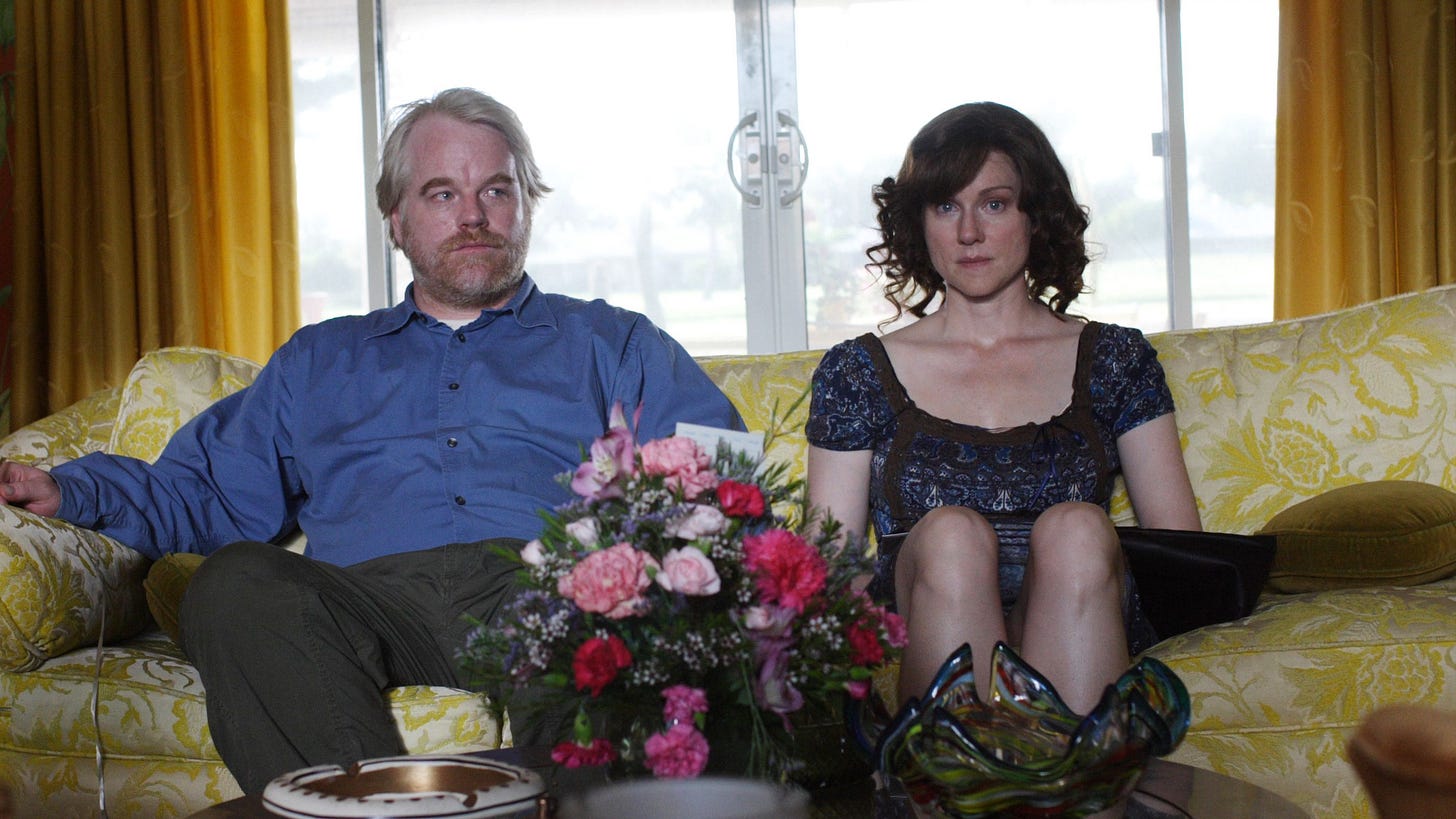The Savages (2007) A final farewell to Philip Seymour Hoffman (part 10)
“We don’t have to go after him Wendy. We’re not in a Sam Shepard play”

Tamara Jenkins second film of three to date is an awkwardly pleasing mix of the surreal to the melancholic, the losing of someone you barely know yet losing and then finding your true, authentic self along the way, the passage of time and the wrecks on the highway of life many can’t remember, but maybe, you can’t forget? Grief. Loss. Guilt. Acceptance. Forgiveness? All of which is etched on the faces and the chameleon-like demeanours of Academy Award nominee Laura Linney and an ever creeping inward performance from the master, Philip Seymour Hoffman. Director Jenkins was also nominated in 2008 for an original screenplay that is cutting, brutally honest, heartbreaking and when you find the real and true nuggets of some genuine situational comedy, flat out hilarious, and the highest compliment I can pay The Savages is that it slowly won me over and performed that rarest of tricks: the film just continued to get better and better until a catharsis of an ending befitting a damn fine film.
The opening 13 minutes:
Sun City, Arizona
The film begins in surreal fashion and in between the bluest of sunshine filled skies and a sun bleached picture of unreality straight from the films of Wes Anderson we find a gaggle of older ladies in the brightest and bluest of summer dresses dancing through perfectly manicured hedgerow archways before golf, early morning swimming and exercise, and a picture of serenity perfectly accompanied by Peggy Lee’s hauntingly beautiful “I Don’t Wanna Play in Your Yard”. As the lyrics continue from the title itself and “If you can’t be good to me” hang in the air, we cut to an unseen man exclaiming loudly that “Somebody forgot something in the bathroom” and after we catch the briefest of glimpses of an older lady looking lost and bewildered even in the bedroom of her own home we find that particular somebody eating cereal in the lounge. “Lenny Savage” (Philip Bosco) may have left the toilet unflushed in the bathroom but he’s at peace with a world he’s growing ever distant of. With his cereal now confiscated by the home-help “Eduardo” (David Zayas) and firmly requested to clean up the minor mess he’s created, Lenny mutters under his breath that Eduardo is a “Son of a Bitch” before leaving him the ultimate message, written by his own shit stained hands. But first we cut to a picture of a smiling and much younger Lenny in the arms of the now older lady in the bedroom being attended to and pampered by an Eduardo full of smiles as he brushes the older lady’s hair before gently replacing a ring on one of her spindly fingers. A radio in the background is playing “On A Slow Boat to China” as Eduardo edges toward the bathroom door and “I don’t hear a flush, Leonard”. Entering we find Lenny has scrawled “PRICK” in his own excrement on the wall and now stands sobbing in the middle of the bathroom.
New York City
“There’s been some trouble with your Dad” so proclaims the female voice on the answerphone message left for “Wendy Savage” (Laura Linney) and after slowly crawling with the director’s camera around Wendy’s apartment, we cut to the beginning of her narration:
“Dear Selection Committee, if awarded your prestigious fellowship for artistic creation, I would use the money to complete the writing and research of my new semi-autobiographical play”
Throughout this stop/start narration, director Jenkins has cut from Wendy in her work cubicle to the incessant drone of a vacuum cleaner nearby and a boss, patrolling the working floor of a now almost empty office. Wendy now deletes “semi-autobiographical” and replaces this with “subversive semi-autobiographical play about my childhood, entitled WAKE ME WHEN IT’S OVER”. With her boss now approaching she quickly switches her screen from her personal plea from the heart back to the mundanity of a multitude of spreadsheets and after affixing a fake smile for the fake boss, Wendy’s narration continues:
“Inspired by the work of Jean Genet, the cartoons of Lynda Barry, and the family dramas of Eugene O’Neill…”
Jenkins cuts to the whirring of a postage franking machine as Wendy seals several large packages:
“Wake Me When It’s Over tells the story of a brother and a sister who…”
Jenkins cuts to Wendy pilfering as much stationary as she can fit in her bag from the office supplies cupboard:
“…after being abandoned by their abusive father, are forced to fend for themselves when their depressive mother goes out on a date, from which she never returns”
Jenkins cuts to Wendy clutching the packages to her chest, a mother holding onto her literary child one final time before releasing it to the world. After posting the packages, Wendy’s narration concludes:
“Thank you for considering my proposal. Sincerely Yours, Wendy Savage”
We cut to Wendy using an extendable pole to grab a box of cereal high up on the shelves of her local store before following her home, saying hello to her cat “Genghis” and after checking the first of two voicemails on her answering machine (Pap Smear — Clear) she answers the door to her boyfriend “Larry” (Peter Friedman) and of course, his faithful if growing ever older dog, “Marley”. He doesn’t want to disturb Wendy, but the glint in Wendy’s eye suggests she wants him to disturb her, to shake her from her late night, after work lethargy. Quickly inside, the lovers are caught immediately in raw passionate kisses as Larry insists they make love on the floor, a thought that repulses Wendy as it’s “middle aged and depressing” and with the passion draining away, Wendy slowly moves Marley from the sofa to sit alone with her frustrated thoughts and desires. As Larry tries desperately to reignite their passions Wendy lies to him saying her pap smear results show an abnormality and she may need surgery, a lie that sets off a surreal chain reaction of purest love from Larry before he immediately falls out of favour with his girlfriend by equating her circumstance with that of his wife many years before. “I don’t need to hear about your wife’s cervix right now!” barks Wendy, but soon the lovers are in the throes of the love making they seek. Well, one of the lovers is enjoying himself! The other stares at the ceiling before turning her head sideways to greet the longing and loving stare of Marley. Wendy smiles at her spectator before placing a hand lovingly over the dog’s paw.
A kiss and a cuddle at the door for her departing boyfriend, Wendy now seeks solace in a bowl of cereal as she slowly patrols her apartment before her eyes are drawn to the constantly blinking light of her answering machine…
Buffalo, New York
A ringing telephone in the dead of night (soon to be seen radio alarm clock shows the time as 1.15am) awakens, or partly awakens “Jon Savage” (Philip Seymour Hoffman) from his slumbers. “Dad is writing on the walls with his shit” blurts out an anxious Wendy to her half-awake brother coming to terms with this shocking revelation as he listens, irritably, and disbelieving, to the answer phone message now relayed to him from Wendy’s machine. “It’s the middle of the night” he gruffly replies in between asking his sister to stop playing that damn message so loudly into his sleep deadened ears, “I’ve got to teach in the morning”. Smoking and pacing up and down her cramped apartment, Wendy wails “Don’t leave me alone with this shit” as she opines she, and indeed Jon, don’t even know where their father lives after next to zero contact over the past few years. Panicking, Wendy calls this a “crisis”.
Jon: “Look, I don’t think this actually qualifies as a crisis. It’s not a crisis. Not yet”
Wendy: “You mean, it’s like we’re in orange?”
Jon: “Yeah. Right. Exactly. But we’re in yellow, OK? So we should just be aware and cautious. And when it’s in red, then we’re in trouble. OK?”
I have no idea why I hadn’t seen The Savages before the month of June in the year of our Lord 2025 but because of my on-going love and admiration for all things Philip Seymour Hoffman, now I have. My tenth and I believe final farewell in this series, and I hope you’ve enjoyed the ride along the way.
I’ll leave the final words on the film to Time Magazine’s Richard Schickel who said in his December 2007 review:
“These actors are unimprovable as, somehow, they find a certain decency under the pressure of their grinding familial chore, a reason to hope that slightly better days may be ahead for them once their duty has been done. Writer-director Tamara Jenkins is less interested in heroically inspiring us than she is in showing us the values to be found in the more modest forms of dutifulness”.
Thanks for reading. I hope this message in a bottle in The Matrix finds you well, prospering, and the right way up in an upside down world.
Whilst you’re here I may as well brag about the release of my trilogy of recently self-published books. Beautiful covers eh! As the title(s) would suggest, this is my life at the movies or at least from 1980 to 2024, and in volume 1 you’ll find 80 spoiler free appraisals of movies from debut filmmakers, 91 of the very best films appraised with love and absent of spoilers from 1990–2024 in volume 2, and in volume 3 you’ll find career “specials” on Paul Thomas Anderson and Quentin Tarantino together with the very best of the rest and another 87 spoiler free film reviews from 2001–2024.
All available in hardback and paperback and here are some handy links:
"A Life at the Movies Vol.1" - link to Amazon
"A Life at the Movies Vol.2" - link to Amazon
"A Life at the Movies Vol.3" - link to Amazon





